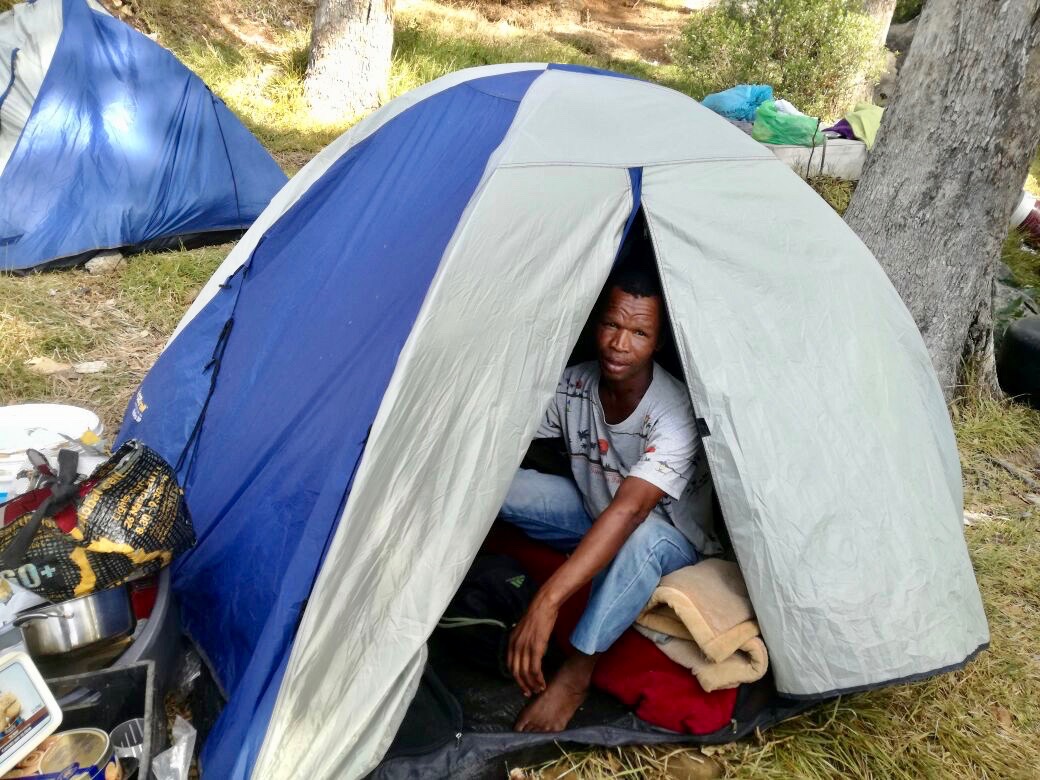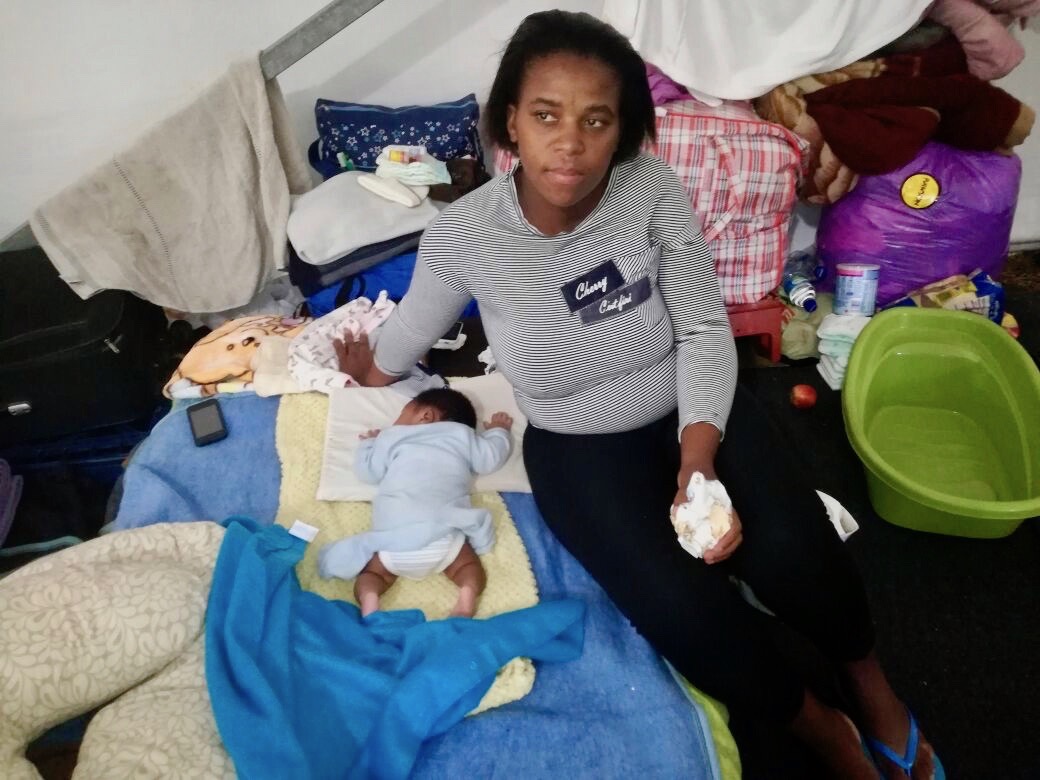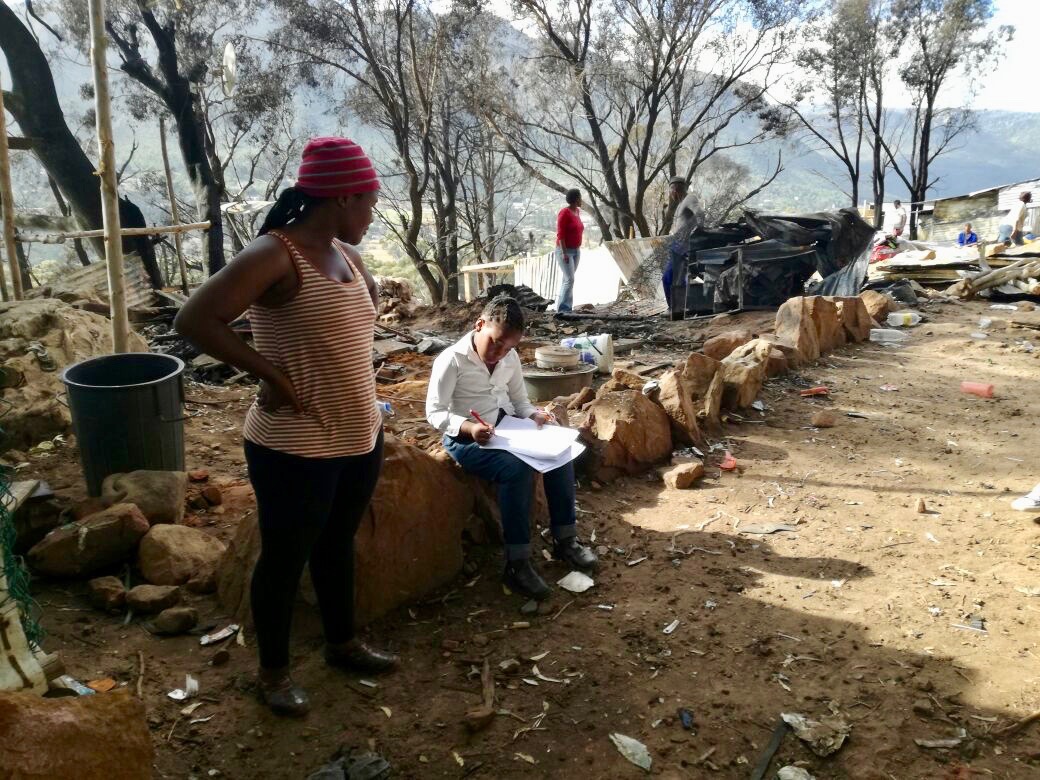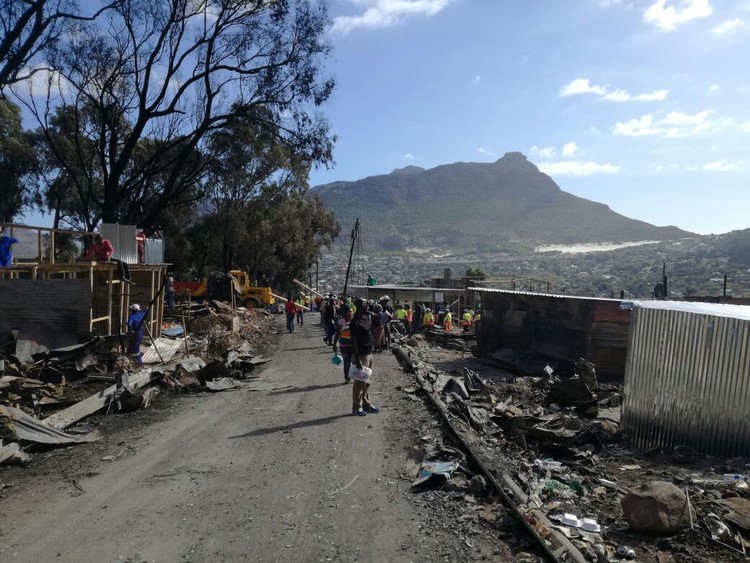Community faces uncertain future after fire in Imizamo Yethu
Mixed reaction among residents to City plans to reblock
Following the catastrophic fire that left 7,300 people homeless five days ago in Imizamo Yethu, many do not know whether or not they will have anywhere to stay when the settlement is reblocked by the City of Cape Town.
Some people are staying on the mountain with no form of shelter at all; others are living in the two marquees provided by the City at the soccer field; many are renting from people nearby or staying with relatives.
Lindile Cola and Yonela Ndyiki do not have family they can stay with in the Western Cape. Cola is from Tsolo in the Eastern Cape. He is now living in a small tent that can only fit a mattress.
He says the only things he saved from the fire were pots. “They were the first things I saw and the only things that I saved,” says Cola. “I have no money. The fire happened [just] ten days after I paid rent.”
Rain on Wednesday night flooded his tent. “I was like a child that wet himself. I stood up and covered myself with the blanket,” says Cola. He is considering moving to Khayelitsha.

Yonela Ndyiki’s tent was ruined by the rain. She had to sit out the showers keeping dry in a Mshengu toilet. She has sent her daughter to stay with family in the Eastern Cape.
In the marquees provided by the City, people sit with the belongings they managed to save from the fire and items donated to them.
Nosipho Mene says life is difficult there. “We have no privacy. We are men, women and children all in one place. You sleep in the clothes that you are in, because you have no space to undress,” she says.

Nandipha Jako and Zikhona Jongiwe, who had never met before they came to the marquee, now sleep next to each other. They both have young children.
Jongiwe says she didn’t save anything from the fire. She has a three-week-old baby. “I just wanted my child to be safe – that is all I was thinking about, making sure he is fine,” she says. “When it was raining [Wednesday] the water came in and wet all our clothes. My child is still wearing the same clothes as yesterday. I have to struggle to get hot water to bath him and to make his food.”
“I worry about his health,” she says. She says her only family in Cape Town are her brothers and they also lost their homes in the fire.
Reblocking Imizamo Yethu
The City of Cape Town plans to re-block the area. In a statement on Monday, Acting Executive Mayor Alderman Ian Neilson said the City “will attempt to establish several large-scale re-blocked areas which will be surrounded by fire-breaks, pedestrian walkways, and peripheral water, sanitation and electricity services”.
On Thursday Neilson said, “This proposal was discussed by the community last night and the majority of the affected residents are in agreement. The success of this plan hinges on the site being thoroughly cleared, with standard plots demarcated so that emergency kits can be disbursed on Monday when rebuilding commences.
“Any building that takes place before the plots are marked out will jeopardise the interests of the affected residents who are conforming with the agreed process, as individuals could take up much larger space than is fair and new residents from outside the settlement could take up space meant for others.
“It is thus in the interest of protecting the affected residents and ensuring fairness that City Law Enforcement will be dismantling all structures before Monday.”
Jako and Anelisiwe Ngalwa agreed with this plan. “We are renting in places that are very small and not even in good condition. People are making us rent on land that is not even their own. They must stop building and wait for the City to do what it wants; not only will it be safe for all of us, but we can also get houses.”
Jako and Ngalwa, who is unemployed and depends on a child support grant, say the people who have started rebuilding often have more than one home and rent out space. “They know they will lose out once the roads are made because they make their money from us.”
But Zukile Kholobile, who has started rebuilding his home, says he cannot wait. “Developing this place will not take a day or a week. They [the City] must not lie to us. There is a lot of work that needs to be done here and I am not going to be staying at some hall until they are done doing so.”
“Yes, we need the roads, but they are also not telling us what size of houses we will be getting when those roads are done. Some of us have families and cannot be squashed in a one-room shack. We must know what we are agreeing to,” said Kholobile.

Chairperson of the Imizamo Yethu Movement, Mkhululi Ndude, says many people are happy with the plans to develop the area.
“The City has told us that it will take five days to do everything that they need to do in the area before people can move in and we are happy with that, because we want people to have their own houses and not have rentals,” said Ndude.
Councillor Xanthea Limberg, the City’s Mayoral Committee Member for Informal Settlements, says post fire reblocking will cater for all fire affected residents, whether or not they are eligible to register on the Housing Database for subsidised housing.
“Almost R100 million has been made available. It includes the design, ground works, installation of basic services, paved walkways, access roads, among others, as well as the City’s Enhanced Emergency Housing Kit. This kit consists of pine poles, galvanised corrugated roof sheets, a wooden door with hinges and a lock set, a wooden-framed window and nails. All of the timber poles that are handed out as part of these kits have been treated with fire-retardant paint,” said Limberg.
“We really appeal to fire-affected beneficiaries not to start rebuilding yet,” she said.
CORRECTION: The report originally stated that 15,000 people were left homeless by the fire. This was a figure supplied by the City which was later corrected to 7,300.
Support independent journalism
Donate using Payfast

Don't miss out on the latest news
We respect your privacy, and promise we won't spam you.
Next: In photos: Students march on Herman Mashaba
Previous: Constitutional Court orders CPS to carry on paying grants, rejects fee increase
© 2017 GroundUp. 
This article is licensed under a Creative Commons Attribution-NoDerivatives 4.0 International License.
You may republish this article, so long as you credit the authors and GroundUp, and do not change the text. Please include a link back to the original article.

